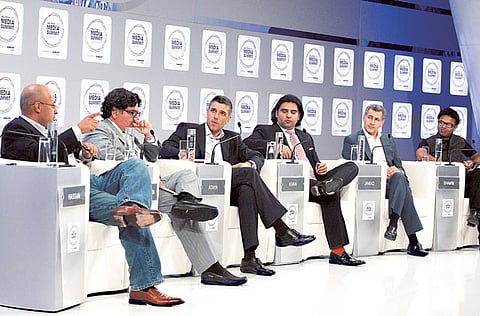Video from mobile to TV will change broadcast media
New technology will give internet based media a dominant role over broadcast media

Abu Dhabi Once video content received by mobile phones can be sent to TV, it will change the existing dominance of broadcast media, a top media executive said here on Wednesday. “The big change that will come in the media scene is that when consumers can seamlessly make selections on their mobile phone and send it to their TV,” Robert Kyncl, Global Head of Content of YouTube said at Abu Dhabi Media Summit.
“That’s coming very soon and for us we’re concentrating on this [mobile] as a first screen and the television as a second screen,” he said.
He said such a technology will give internet-based media a dominant role over broadcast media. Kyncl expects such a transformation in the next five years but has no doubt about the dominance of broadcast media in the current media scene.
“The Superbowl in the United States has a 100 million viewers at the same time…. You could not do that on the internet. So internet-based firms such as ours are focusing on shorter form content on the things that may be less well done on television and, therefore, complimentary,” he explained.
Kyncl said that YouTube is not in competition with television. He cited the example of Yoga channel on Youtube. “A broadcast channel may not be able to afford to give such a specialised service.”
Kyncl was speaking at a session titled ‘Conversation: The war for the living room; the internet takes on television’. Rob Budden, Chief Media Correspondent of Financial Times was the moderator of the session attended by Kyncl and Ward Platt, President, Asia Pacific and Middle East, Fox International Channels.
Kyncl said brands are more important than the content. In a world of abundant choices of content, people will look for brands which they trust, he said. He cited National Geographic as the perfect example. Even if he does not know the details of the content on National Geographic, he trusts that brand. He said the youth from the Middle East have a prominent role on internet media.
The talent from the region regularly win film contests organised by YouTube, he said. And a huge chunk consumers of YouTube are in Saudi Arabia, Kyncl said. The innovative way of placing advertisement on YouTube has gained a special advantage.
The viewers can skip the ad if they are not interested in it and the advertisers have to pay in accordance with the viewership, he explained. In that way viewers are not annoyed by unwanted ads and advertisers are paying only if the ad is viewed, Kyncl said.
Sign up for the Daily Briefing
Get the latest news and updates straight to your inbox

